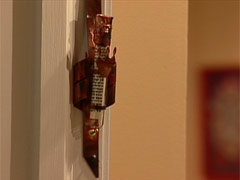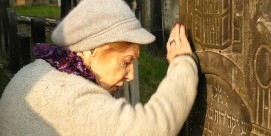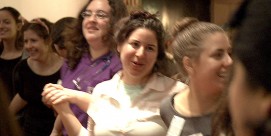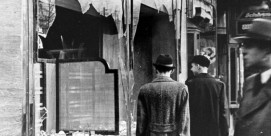In This Episode << SLIDE LEFT TO SEE ADDITIONAL SEGMENTS
Mezuzah
RABBI TAMARA MILLER: The word mezuzah means doorpost. So in the Book of Deuteronomy, in the sixth chapter, it does say that we should put on our doorposts, on our gates of our homes, this mezuzah.
Most often the mezuzah will have the letter Shin. It stands for one of God’s names, which is Shaddai, which has been translated as “Almighty.”
Inside is the holy text that comes from the Book of Deuteronomy. We call it the Shema, which means “Hear, O Israel, the Lord is one.” And then it continues to say what we should do, which is to love your Lord, your God, with all your heart, with all your mind, with all your spirit. The text is always the same. It has to be on parchment.
 In order for it to be authentic, it has to be written by a holy person for whom this is their holy work. And so that mezuzah, what’s written on that parchment is a way of saying God, the universe, the holy is protecting us as we go in and outside of our homes.
In order for it to be authentic, it has to be written by a holy person for whom this is their holy work. And so that mezuzah, what’s written on that parchment is a way of saying God, the universe, the holy is protecting us as we go in and outside of our homes.
Chanukat Ha’Bayit means dedication. Chanukat means “a dedication” of the Bayit, “of the home.” It’s important that people do witness your new home and be part of the ceremony.
The mezuzah is placed on the right-hand side of the doorpost, about a third of the way down, and in the homes of Ashkenazic Jews, Jews from Eastern Europe, they would have it slanting inside, towards the open of the door, towards the home. The Sephardic Jews that come from North Africa, they put it straight up and down.
If you only have one mezuzah, it should be placed outside. Then you can put a mezuzah on every door in your house, outside every room. The only place you’re not supposed to put it on is the bathroom.
An object such as the mezuzah is so accessible to people. You don’t have to go into the synagogue. You just have to go into your house, which is something that you do on a daily basis. I love the fact that it’s affixed, and it’s not movable, because that’s like God is our rock—always there, always affixed to our hearts.







